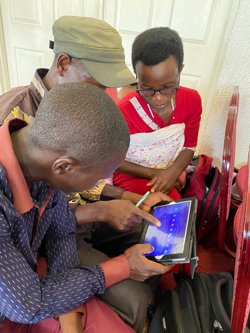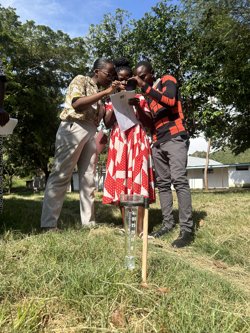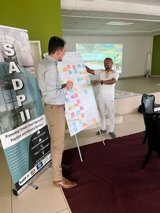'Thanks to G4AW, we were able to grow into a mature business'
The Netherlands invested in the Geodata for Agriculture and Water (G4AW) programme for ten years. In this series, key players look back and look to the future. Stef
Stefan Ligtenberg ©Weather Impact
an Ligtenberg is director of Weather Impact: 'We approach small food producers not as in need, but as entrepreneurs. And that works.'
Weather Impact was involved in no fewer than eight G4AW projects. Why this popularity?
'We provide weather data. That is a popular service. Just think: how often do you yourself use a weather app on your smartphone? Weather apps are invariably in the Top 5 most used applications. In Africa, weather services are also becoming increasingly popular. Food producers want to know when it will rain, when best to sow, and how to optimise their harvest. Our weather service was of great value to farmers in the various projects.'
Not everyone has a smartphone and certainly not there. How did you solve that?
'The basis is the same as with us: weather models. These are fed with satellite data but also with information from weather balloons, ships, and measuring stations on the ground, for example. In Africa, we work mainly with the weather models of the European weather service ECWMF. You can create a short message containing the most important weather information and send it to farmers via SMS. Such a message can be up to 160 characters long but in our case it contains, for example, the expected rainfall probability, rainfall amount, and temperature for three days ahead and for the three days after that.'
Is that what you call an agrometeo SMS service?
'That's right. It is an SMS weather report specifically for agriculture in a particular area. Text messaging did turn out to have a few drawbacks. At one eurocent per message sent, it is relatively expensive if you send it to tens or hundreds of thousands of farmers week after week. In addition, a text message offers little room for additional information. And you throw such a message "over the fence". So you don't know whether people actually receive it and what they do with the information. That is why we are now working on a new service. With a chatbot based on Telegram, we can bypass all the disadvantages of text messaging. Only then again, you need a data connection and a smartphone to read it.'
How important are
©Weather Impact
these services for smallholder food producers in Africa and Asia?
'The food producers we serve had little or no access to a weather report. Farmers traditionally make decisions based on knowledge handed down from generation to generation. With climate change, this does not work so well. Our services give food producers more up-to-date information. Thanks to agro services, farmers are not a plaything of circumstances, but are able to foresee the weather to some extent. This leads to action perspective.'
What was your biggest success within the G4AW programme?
'In Kenya, we supported CROPMON with two text messages a week that reached 150,000 farmers. And GAP4A is also a success story as far as I am concerned. We have now been providing weather services to farmers in Burundi for more than five years. There, hundreds of thousands of farmers are involved in the project making it possible to run the service cost-effectively. Last winter we trained all 850 activators of AUXFIN in how to interpret weather information and use it in agriculture. They in turn pass on their knowledge to local food producers.'
Does this knowledge benefit them a lot?
'Here in the Netherlands, everyone has three weather apps on their phones, we have KNMI (Dutch MetOffice) and a weather report after the news on TV. You could say we have 100 per cent weather information. With one simple SMS-weather service, you take farmers in developing countries from almost zero information to eighty per cent. With a very small amount of information you literally change their world.'
Do food producers also immediately see the added value of these services?
©Weather Impact
'One of them said we were doing God's work because he could see into the future thanks to the weather forecast. That's obviously very special. On the other hand, once you provide people with eighty per cent of the information, they also want the other twenty per cent and start asking questions. Is it going to rain in the morning or just in the afternoon today? And how can you disagree, we want that too, don't we? This critical attitude indicates that what we do makes an awful lot of sense. That farmers no longer operate by chance but as entrepreneurs. And that is a nice spin off of the G4AW programme, which primarily focused on achieving greater food security.'
Will you succeed in continuing and further expanding the services?
'Scaling up and expanding is a big challenge. For this, we are not big enough and we are not, like AUXFIN, for instance, permanently present in the target countries. But we are doing what we can, also through other routes, and with (local) partners.'
Can you give an example of that?
'We focus on local meteorological institutes because there is still a big deal to be done there. Weather institutes used to be run more professionally than they are today. For various reasons, weather institutes and stations have fallen into disrepair. As a global society we benefit from local weather institutes being well organised and able to make their own weather models and send out weather reports. This requires training, among other things, and we help with this through projects funded by the World Bank and others.'
How has the G4AW 
©Weather Impact
programme influenced Weather Impact's work?
'The idea to set up Weather Impact arose right around the time the G4AW programme was being developed. G4AW gave us the opportunity to grow from a new and searching company to a mature business that develops services and can exist from them. It also gave us the time and space to delve well into what is needed in developing countries. We should not see African farmers as needing help but rather as entrepreneurs. With the right information, they can make their own decisions independently of us.'
What has working on all these G4AW projects meant to you personally?
'We can come up with all kinds of solutions from behind a desk in the Netherlands with the best of intentions. But then - this really happened - we make an icon that everyone recognises as the sun: a little black ball with eight rays. And what is the result? The locals mistake it for a spider. Which icon to use though, you find out when you go there and talk to the farmers about what they need and experience. Within G4AW projects we did this a lot and it changed my world view. You see how poor some people are, how dire their situation is. How they cultivate land with big differences in altitude, which is then washed away if it rains hard just once. Often there is no internet or even electricity for days. When you experience this yourself, only then do you realise what you have to develop to be of value to these people. G4AW gave us that opportunity and it has provided a lot of valuable insights.'